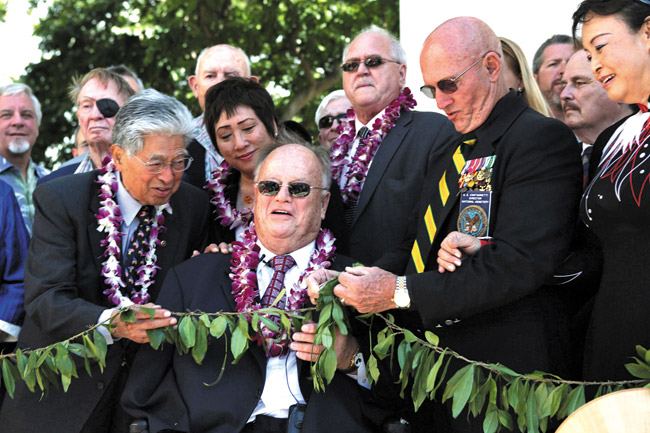An American Hero’s Surprise

Flanked by veterans, former Sen. Daniel Akaka, Congresswoman Colleen Hanabusa, American Battle Monument Commission secretary Max Cleland and National Memorial Cemetery of the Pacific Superintendent Gene Castagnetti untie a maile lei, officially dedicating the new Vietnam War pavilion at the memorial following the annual Veterans Day ceremony on Nov. 11. The new Vietnam War pavilion combined with the already existing Vietnam War Courts of the Missing at Punchbowl constitute the only federal memorial to veterans of the Vietnam War built solely with federal funds. AP / American Battle Monuments Commission photograph
On the morning of April 8, 1968, an Army helicopter was traversing a shard of scrubby jungle a few clicks (kilometers) south of the DMZ (Demilitarized Zone) separating North and South Vietnam. It was carrying a small team of men from the First Air Cavalry Division from Khe Sanh to the crest of Hill 471, tucked into the very northeast corner of South Vietnam, to set up a radio relay site. The site was already secured and occupied by a squad of Marines, so setting up the generators and antennas should be routine.
Capt. Max Cleland, from Livonia, Ga., was in charge of the detail. He had but a few weeks to go until he would be homeward bound. From his book, Heart of a Patriot, “… it was a short uneventful hop to the base last man off the chopper … ran low under the whirling blades … As the chopper lifted off. … grenade on the ground where I had landed … thought it had fallen off my web gear … reached over to pick it up … White flash and massive explosion … hurtling through the air … couldn’t see … explosion echoed in my ears … on my back, saw the sky … right hand … nothing there, gone, used left hand to push myself up … something badly wrong with my legs … Looking down, no right leg …left combat boot askew next to my left knee … green fatigue pants smoking and soaked with blood … pain all over my body … fading, like falling backward dropping down a shaft into the earth below me.”
Max was immediately medevac’d to the division aid station. “A medic gave me a shot of morphine. I looked up and hissed (through his ripped open windpipe), “Am I going to make it?”
“You just might,” he replied almost casually, as if a coin would be flipped and one side said “live” and the other side said “die.” The coin came up “live,” but he never thought he would be able to live his life anywhere close to the way he had always envisioned.
At Walter Reed Army Medical Center, he endured the long, painful journey of recovery and rehabilitation, spurred on by the inexorable accumulation of tiny victories one by one; getting through the pain of constantly changing bandages, the process of toughening up the skin on his leg stumps, learning to work buttons and zippers and the frustration of dressing himself, navigating a wheel-chair with only his left arm. Fending off the inevitable bouts of disappointments and depression.
He was constantly encouraged by his fellow patients there. The kidding and humor sometimes bordered on brutal, but always effective. Pity parties were not an option. And with so many seriously wounded patients, there was always at least one guy worse off than you, from which you could draw an embarrassing tinge of gratitude.
Max Cleland always was hounded, even if subconsciously, by the realization that he had done all this to himself. How could he have been so careless with one stupid grenade? How could he be so unlucky? Nevertheless, he steeled his will and decided to win.
To make a long story short – an affront to the man – Max not only willed his recovery but went on to a distinguished career of public service: the first Vietnam Vet to serve in the Georgia state senate, later through an appointment by President Carter the head of the Veterans Administration. Then he became Georgia’s youngest Secretary of State. Then he made true his dream of becoming a U.S. Senator.
Finding himself fighting a long dormant case of PTSD triggered by 9/11 and the Iraq war, he returned to Walter Reed where he was surrounded by inspiring young wounded warriors from Iraq and Afghanistan. As the fold-over of his book jacket says, he “again finds the faith and endurance to regain control of his life.”
President Obama appointed Cleland Secretary of the American Battle Monument Commission in 2009, where he has been instrumental in the completion of the Vietnam Battle Maps at the exquisite map gallery at our Punchbowl.
His second recovery was helped immensely by a fellow Vietnam vet who saw Cleland’s story on a documentary film and immediately telephoned him. “I saw your documentary about combat medics. I just want to let you know, it wasn’t your grenade.”
(pause) “We need to get together”
Face to face, the story unfolded; “A soldier getting off the helicopter with you dropped it. A “newbie,” he had loosened all the pins on his grenades because he was afraid he wouldn’t be able to get them out during a firefight. When the grenade fell off his flak jacket as he jumped out of the chopper, the pin just fell out.”
This was exactly opposite of what they taught soldiers to do.
“For the first time, I realized it wasn’t my fault. For 30 years I had been beating myself up. The relief I felt was extraordinary. It changed everything for me.”
Max Cleland (just another wounded warrior, as I’m sure he would say) will be the featured speaker at the Pearl Harbor ceremony Saturday (Dec. 7).
coffee1776@gmail.com





